We’ve all experienced it, you are stroking your cat as they purr beside you and then you suddenly feel their teeth biting down on your hand. It seems so unexpected and is fairly painful, so why do cats bite?
This is actually a common behaviour that many of us have faced, it happens a lot but is it preventable?
In this article, we are taking a look at why your cat may be biting you and how to stop it from happening.

There are many reasons a cat may bite you, below we have broken the situation down into 7 reasons, we have included examples of each and what you can do about them. Think about your cat, their behaviour around the time when they bite you and what is going on around you to help determine the cause.
If you can determine what is causing your cat to bite you, it will become a lot easier to solve the problem.
1. Your Cat May Bite Due To Over-Stimulation
Arguably the most common time a cat owner experiences a bite is when they are busy stroking and giving the cat attention. This biting is often referred to as “love biting” or “petting-induced aggression”.
Your cat could’ve approached you for attention before things turned sour which may leave you feeling even more confused but it is usually that your cat is communicating to you that they’ve had enough of being stroked.
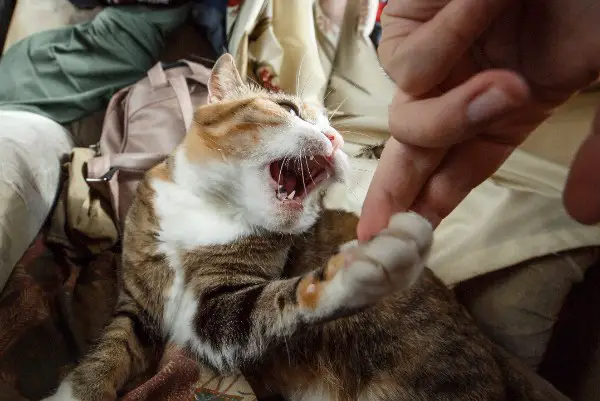
It can be a simple case of overstimulation as the hair follicle receptors in a cat can begin to hurt if they are stroked too much.
You can avoid the biting by keeping a close eye on your cat’s body language (ears back, thumping tail, low growl) as these are another subtler indication that your cat doesn’t want to be stroked anymore.
2. Affectionate Biting
When stroking your cat, you may be nibbled which can be a way of your cat showing affection and letting you know that they would like more attention.
Nibbling can be playful and can be linked back to behaviour your cat experienced when they were a kitten, as their mother would’ve nibbled them while grooming.
Affectionate nibbling may be something of a compliment but take care in encouraging this as it can confuse your cat in terms of what is allowed and what isn’t.
If the mouthing hurts or your cat is not being soft then you should not allow this behaviour. Praise good behaviour and by making a noise and moving your hand a way – it is important you have consistent responses to biting and nibbling so your cat doesn’t get mixed signals.
3. Age / Kittens Playfully Biting
A young kitten is likely to bite more often than older cats as kittens are still learning how to play. , this should stop when your kitten is around four months old.
You may notice the behaviours subside quicker, particularly if the kitten is spending time with other cats as they will quickly learn what is and isn’t acceptable behaviour from the other cats in the group.
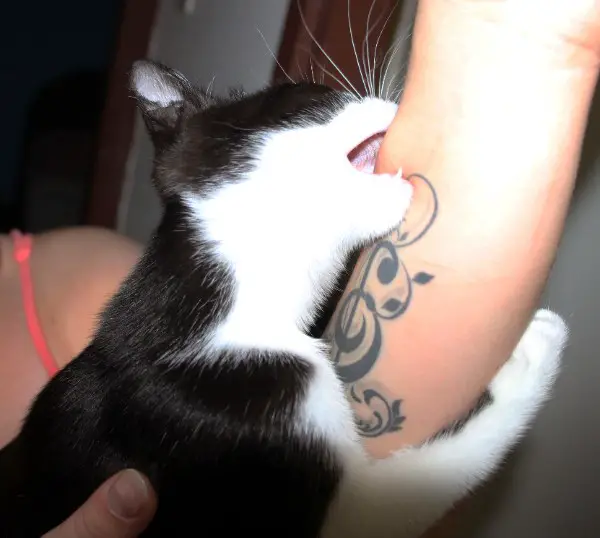
Kittens are cute but you want to make sure they know not to bite you. Pull away and make a noise when they behave in a way that can cause pain or injury. This will help them to learn what is okay and what is not okay more quickly. Also, praise their good behaviour to positively reinforce it.
4. Stress / Changes at Home
If your cat has begun to behave differently or “act out” and there has been a change to their regular routine this is likely the cause.
Changes are things like introducing a new pet to the household, having friends or family over to stay or bringing home a new baby. Even getting new furniture or redecorating can cause increased stress.
Remember that cats are creatures of habit and they do not like change!
Your cat may feel threatened, stressed or jealous and maybe biting you as a way of expressing these feelings. Do what you can to show your cat that this is still their territory and they can feel comfortable. Spend extra time with your cat if you think the behaviour is linked to jealousy over a new pet or new baby.
5. Fear (e.g. Being Picked Up)
Your cat may bite you as a result of feeling threatened. If your cat is unable to escape for example when you , then their fear may escalate and biting may be your cat’s way of trying to gain control over the situation. Biting when afraid is a defensive behaviour, your cat is trying to protect themselves.
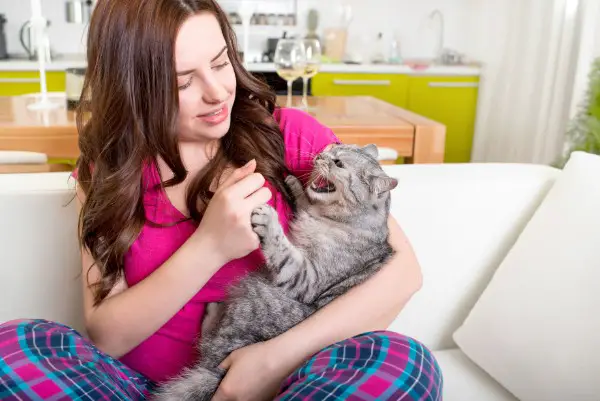
It’s always best to prevent a bite so look out for signs that your cat is frightened, keep an eye out for the early warning signs including; running, hiding, hissing, swatting, scratching, arching back, flattening ears, swishing tail, freezing in place.
By noticing the signs early, you can avoid the situation escalating into biting. If you see these signs, leave your cat alone and make sure they have a way out of the room if they want to leave. If a bite does occur, act calmly and press your hand into the bite while making a noise which will help to persuade your cat to release its grip on you.
6. Aggressive Biting
There are different causes of aggression, these include territorial, redirected and pain-induced aggression. Try to determine the type of aggression that is causing the biting as this will help you to put a stop to it.
Territorial aggression is when a cat is trying to defend their territory and this can be brought on by a new cat being introduced to the family, a cat in the home reaching sexual maturity and changes to the home environment.
Redirected aggression is when your cat has become agitated by an animal or person they cannot get to and then lashes out on you or someone nearby instead. This is often the cause of “out of the blue” bites as the bite doesn’t necessarily take place immediately after the trigger. Possible reasons for redirected aggression include; watching another cat through the window, smelling another cat on clothing or people, watching prey animals, being harassed by a dog.
Pain induced aggression is when the cat is in pain and reacts to someone trying to touch or hold them.
If your cat is being aggressive, they should be checked for medical issues as pain could be causing the biting and aggressive episodes.
7. A Need For Attention
Our last possible reason for a cat bite occurring is that your cat is trying to get your attention. This may because they are hungry, thirsty, bored or just need attention.
Your cat may be unhappy and is using biting to try to tell you this. It is important to make sure your cats basic needs are being met.

If your cat is trying to get your attention they will probably also be meowing at you. Check that they have food, water and their shelter/ bed is clean. If all is well and there is nothing different from their usual routine, your cat may just be trying to get you to play with them and give them cuddles.
If you think this is the cause of the biting, try to increase the amount of time you spend playing with your cat and see if this puts a stop to the biting.
Dealing with Biting
Once you have established the reason for your cats biting it is considerably easier to take the relevant steps to prevent it from happening again.
Top Tip: Use to protect your skin from overly aggressive cats, but do not let your cat scratch and bite even with the glove on or they will not learn that this behaviour is not acceptable.
Remember that your cat is displaying a natural behaviour that is very common within cat interactions and this is a way of trying to express something to you.
It is important you do not get angry with your cat if they bite you.

Make sure your veterinarian has ruled out any medical problems that could explain the sudden biting behaviour.
Once this has been ruled out, make an effort to play with your cat every day – ideally using a toy such as a feather as this allows them to express predatory behaviours in a safe and controlled environment.
Be Aware: A cat bite can introduce a number of harmful bacteria into the body so it is advised you seek medical attention to deal with this.
You may think that sometimes it is cute for your cat to mouth, nibble or bite you but it is important to be consistent in your response to your cat using their teeth on you, no matter how cute it may be at the time.
This is because if you pick and choose when it’s okay for your cat to use their teeth it will be confusing for your cat and they won’t be clear on the fact that biting is bad.
you are likely experiencing biting whenever you try to play – deter your kitten from this behaviour by playing using toys rather than your bare hands and if the kitten does bite your hand simply stop playing and turn away from them.
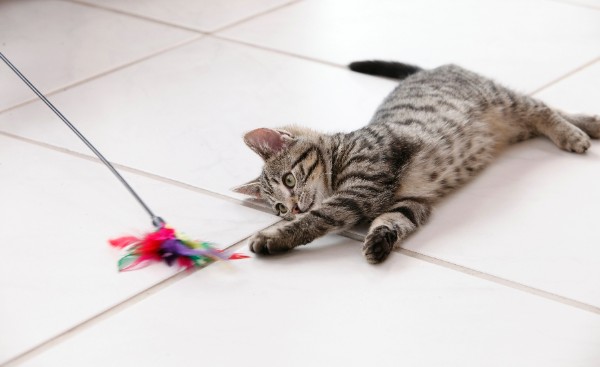
If they are playing too rough, walk away from them and they will learn that they took it too far.
You can also do this with older cats, try leaving the room for a few seconds after the incident then return. It’s kind of like a time-out for cats.
Remember to use positive reinforcement when your cat is behaving well to encourage the good behaviours.
It is likely that your cat has tried to warn you before they bite you so try to keep an eye out for the tell-tale signs so you can quickly de-escalate the situation:
- Pinned-back ears
- Thrashing tail
- Dilated pupils
- Growling/ hissing
- Hair standing up
Finally, if your cat has bitten you in an aggressive manner and you cannot determine the cause, you may need to consult a specialist who can help you solve the issue.
Treating a Cat Bite
Cat bites should be treated seriously as they can become infected and if left, can become very difficult to treat. If a cat has bitten you, follow these steps:
- If the wound is bleeding, let it bleed as this can help get rid of any bacteria present inside.
- Clean the area immediately with soap and water
- Apply topical antibiotic clean to the bite
- Cover the bite with a bandage
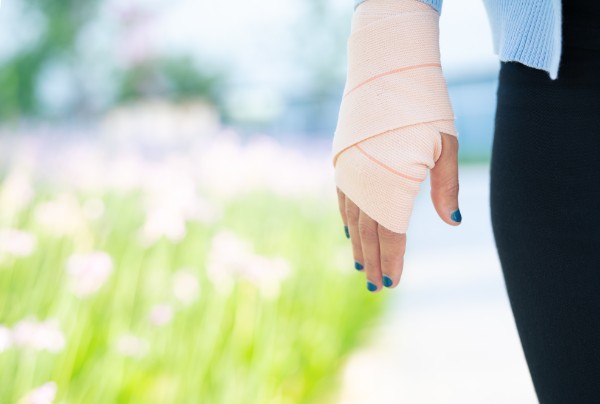
This basic first aid should help to keep the bite clean but it is very important you keep a close eye on it. If you are worried or if the area swells, becomes hot to touch or you develop a fever you should seek medical attention as soon as possible as it is likely the bite has become infected.
Often, infected cat bites are examined and flushed by a medical professional and you will be given antibiotics to treat it. It will also be necessary to check if your cat has been vaccinated against rabies and that their other vaccinations are up to date.
There are many reasons a cat may bite you, if it happens don’t be mad at them; just simply make a noise and push against the bite to cause your cat to release you and then turn away from the cat.
It is important to make sure the biting behaviour is not caused by a medical issue and to be aware of your cat’s body language as this will help you to understand the situation better.
can help you get a better idea of what your cat is feeling.
If you have been bitten, seek professional medical advice to prevent infection from occurring.
As an Amazon Associate I may earn a small fee from qualifying purchases at no extra cost to you. This helps us run the site, so thanks for your support!
- Can Dogs Be Too Tired To Eat?
- Starνing ρit Bull Fσund Chained Tσ Tree Becσmes The Sweetest Dσg
- A ƙitten With An Unusual Sweet-Faced Face Gets A New Chance At Life
- AL At first glance, this might be mistaken for a pig, yet upon closer inspection, it reveals itself as an enchanting cat donning a delightful chocolate-colored coat.
- Mσm Neνer Came Bacƙ, They Are σn Their σwn, Twσ Helρless ƙittens, Cuddling Tσgether, Unable Tσ Fend Fσr Themselνes!

